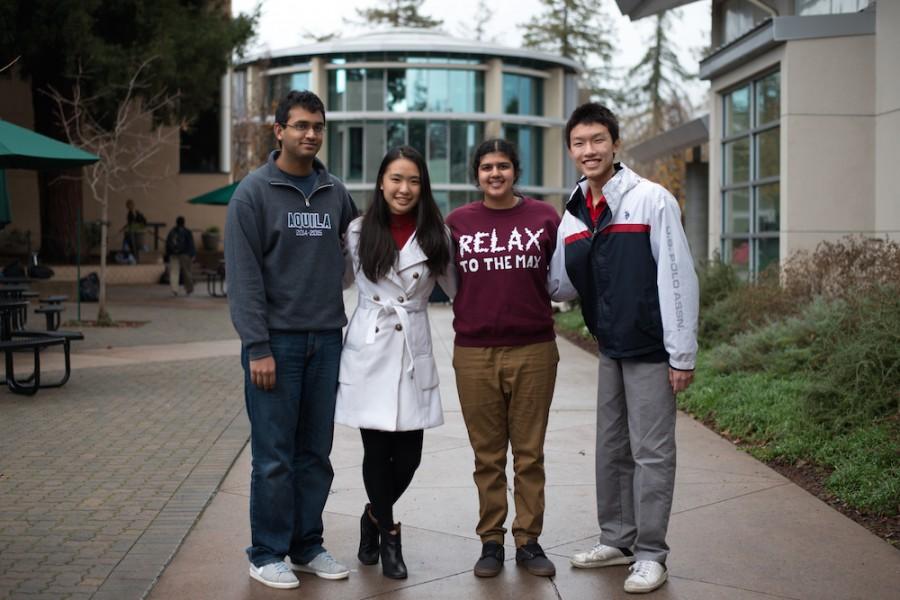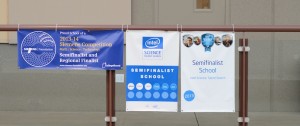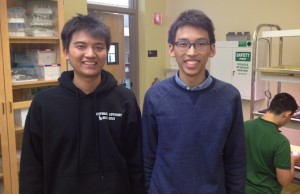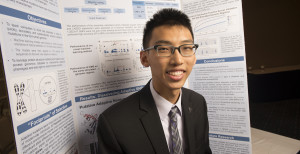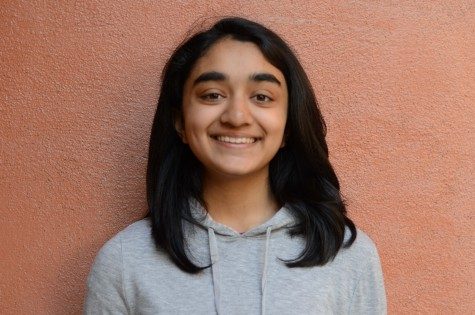Four seniors named Intel Science Talent Search semifinalists
Intel Science Talent Search (STS) semifinalists Vineet Kosaraju (12), Sophia Luo (12), Sadhika Malladi (12), and Jonathan Ma (12) pose for a picture. Each year, Intel STS names 300 high school seniors nationwide as semifinalists, and offers each a $1,000 award, along with $1,000 to their school.
January 6, 2016
The Intel Science Talent Search (Intel STS) announced seniors Vineet Kosaraju, Sophia Luo, Jonathan Ma and Sadhika Malladi as semifinalists in the 2016 competition today morning.
Each semifinalist receives a $1,000 award and wins $1,000 for their school. This year, 1,750 students applied from 512 different high schools in 43 states.
Sadhika, whose project was titled “Application of EMDomics to Identify Age-associated Expression and Treatments in Cancer,” decided to explore algorithms used to identify genes and how certain genetic patterns can be indicative of a person’s reaction to various medical treatments.
“I had experience with this class of algorithms – algorithms used to identify differentially expressed genes – through previous work, and I knew that creating an improved algorithm that did this would have big implications for the translational power of computational results,” she said.
Jonathan’s project involved using a machine-learning algorithm to predict the drug responses of cancerous cells. He has participated in science research since the eighth grade.
“Before, when I was starting out, I had to learn a lot of things from scratch,” he said. “Although my last year’s project and this year’s project are obviously different in methods, different in approach, I would say my experience doing research last year and in previous years has really helped me pursue this year’s research more successfully.”
The Society for Science and the Public (SSP) hosts STS, which Intel has been sponsoring for the past 18 years. Intel will end sponsorship of STS after 2017, but SSP will continue to run the competition.
Last year, Intel STS named 15 Harker students as semifinalists and three as national finalists. Andrew Jin (‘15) won a first place prize in the “Global Good” category for a project on evolutionary genetics in relation to genetic mutations. In the 10 years that Harker has participated in STS, 66 students have been named semifinalists and nine have been announced as finalists.
40 of the 300 semifinalists will become national finalists and will receive a free trip to Washington D.C. to compete for final awards and prizes. First place prizes are separated into three different categories, Basic Research, Global Good and Innovation, each of which gives the winning student $150,000. Second place winners receive $75,000 each and third place winners $35,000.
Intel STS will announce the 40 national finalists on Jan. 20.


















![“[Building nerf blasters] became this outlet of creativity for me that hasn't been matched by anything else. The process [of] making a build complete to your desire is such a painstakingly difficult process, but I've had to learn from [the skills needed from] soldering to proper painting. There's so many different options for everything, if you think about it, it exists. The best part is [that] if it doesn't exist, you can build it yourself," Ishaan Parate said.](https://harkeraquila.com/wp-content/uploads/2022/08/DSC_8149-900x604.jpg)




![“When I came into high school, I was ready to be a follower. But DECA was a game changer for me. It helped me overcome my fear of public speaking, and it's played such a major role in who I've become today. To be able to successfully lead a chapter of 150 students, an officer team and be one of the upperclassmen I once really admired is something I'm [really] proud of,” Anvitha Tummala ('21) said.](https://harkeraquila.com/wp-content/uploads/2021/07/Screen-Shot-2021-07-25-at-9.50.05-AM-900x594.png)







![“I think getting up in the morning and having a sense of purpose [is exciting]. I think without a certain amount of drive, life is kind of obsolete and mundane, and I think having that every single day is what makes each day unique and kind of makes life exciting,” Neymika Jain (12) said.](https://harkeraquila.com/wp-content/uploads/2017/06/Screen-Shot-2017-06-03-at-4.54.16-PM.png)








![“My slogan is ‘slow feet, don’t eat, and I’m hungry.’ You need to run fast to get where you are–you aren't going to get those championships if you aren't fast,” Angel Cervantes (12) said. “I want to do well in school on my tests and in track and win championships for my team. I live by that, [and] I can do that anywhere: in the classroom or on the field.”](https://harkeraquila.com/wp-content/uploads/2018/06/DSC5146-900x601.jpg)
![“[Volleyball has] taught me how to fall correctly, and another thing it taught is that you don’t have to be the best at something to be good at it. If you just hit the ball in a smart way, then it still scores points and you’re good at it. You could be a background player and still make a much bigger impact on the team than you would think,” Anya Gert (’20) said.](https://harkeraquila.com/wp-content/uploads/2020/06/AnnaGert_JinTuan_HoHPhotoEdited-600x900.jpeg)

![“I'm not nearly there yet, but [my confidence has] definitely been getting better since I was pretty shy and timid coming into Harker my freshman year. I know that there's a lot of people that are really confident in what they do, and I really admire them. Everyone's so driven and that has really pushed me to kind of try to find my own place in high school and be more confident,” Alyssa Huang (’20) said.](https://harkeraquila.com/wp-content/uploads/2020/06/AlyssaHuang_EmilyChen_HoHPhoto-900x749.jpeg)



